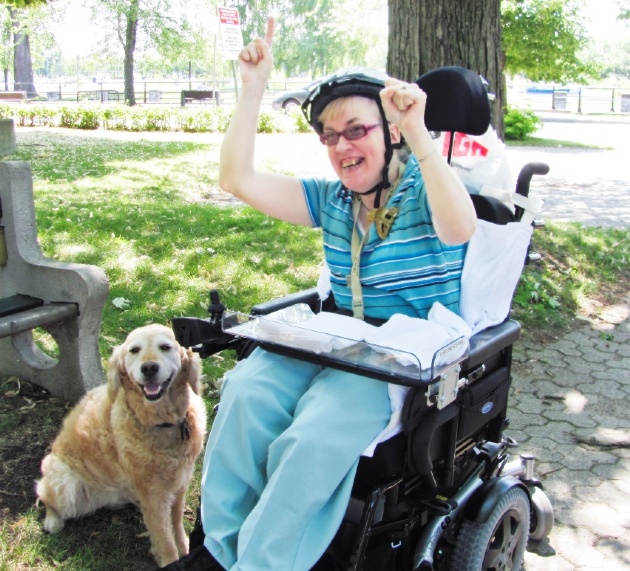As
part of our ongoing look at the city's multi-faceted English-speaking
community, one of our writers interviewed Laval-born Christine Stepien, who has
lived her entire life in a wheelchair.
Q; First of all, Christine, and since many
of us don't know, what exactly is cerebral palsy?
A; In my case, some brain damage occurred
during pregnancy, and I was born prematurely. As a result, I'm physically
challenged. I'm 55 years old and I have never walked. My body is very limited. I
need help getting up, getting dressed, and going to the bathroom. It primarily
affects motor skills.
Q; What was it like growing up in Laval?
A; Very lonely! I was ostracized by other
children. My mom would take me out for walks in my wheelchair. People would
stare and some were afraid that I might be contagious. Maybe they were too
afraid to ask. I know some people thought there was something wrong with me
mentally, as well.
Q; Where did you go to school?
A; There was no place in Laval that could
accommodate me when I was ready for school. It was either too many stairs or no
one available to take me to the bathroom. I had to commute to the Mackay Centre
School in Montreal.
Q; Did you graduate from the Mackay Centre?
A; No, I had to leave before then. There
were complications when I was growing. My feet were crooked and I had to have
several operations, which meant a long hospital stay. Then infection set in, so
we spent time looking after that. That was the end of my formal education!
Q; But you read and write very well, don't
you?
A; Yes, I taught myself as much as I could,
through reading and watching the news. I'm very well informed and I go out as
much as I can to socialize and learn about the world.
Q; Tell us about growing up in Laval.
A; Our neighbours have always been great. My
childhood friend was Pam. She lived next door and she looked past my chair. We
went everywhere together. I was 15 when her family moved away. Then a large
family moved in, and they were all friendly and would come to visit. I didn't
get out much, so I relied on people coming to visit.
Q; Have you ever spoken French?
A; Not really. I speak English and Polish,
which is my parents' mother tongue. We lost my father over a decade ago. My
mother is a wonderful lady in her late 80s, full of spunk and humour.
Unfortunately, she now has Alzheimers and needs around-the-clock care.
Q; Why did you leave Laval, Christine?
A; When I was 47, I realized that taking
care of me was becoming too much for Mom. Dad had passed on and my mother was
working at the Miriam Home. Plus I wanted to be on my own, doesn't everyone?
Sometimes I dream about what my life would have been if I could have walked. I
was going to be a nurse and marry a lawyer and have a family, wouldn't that
have been great?
Anyway, there was nowhere in Laval for people
my age with my needs. A Laval social worker helped me find a place in Lachine, in
an assisted-living residence near two wonderful friends, Belva and Richard, who
have always thought of me as family. I try hard to be independent, but of
course I have to rely on others a lot.
Q; You've
had some great adventures, I hear?
A; Yes! I've gone sailing, I got to see
Disneyworld, and I go home once a week to visit Mom. I go out to dinner and
shopping on a regular basis. With the help of another friend, I've written a
book and we're looking for a publisher. It's called "The Broken
Bridge."
Q; What advice might you have for other
people living in a wheelchair, Christine?
A; My motto is "always be happy."
I have a good sense of humour and I tend to look on the bright side. I never
let myself get down for too long. There are people worse off in the world than
me, right? I believe in the power of being positive. And I'm so grateful for
the love of friends.
About the Author
Lorrie Beauchamp is a Montreal-based journalist, freelance writer and business owner. She is a member of the Quebec Writers’ Federation, former student of and editor for the Thomas More Institute newsletter, and co-founder of The Writers’ Bloc, a literary group celebrating English writers in a city where everyone, including the majority, is a minority.

 In The Latest Issue:Latest Issue:
In The Latest Issue:Latest Issue:
- A Bittersweet Farewell
- The new Laval Aquatic Co...
- The End of an Era:
Articles
Calendar
Virtual- ANNUAL TEACHER APPRECIATION CONTEST
- APPUI LAVAL
- ARTS & CULTURE
- CAMPS
- CAR GUIDE
- CCIL
- CENTENNIAL ACADEMY
- CHARITY FUNDRAISING
- CITYTV
- COSMODÔME
- COMMUNITY CONNECTIONS
- COVER STORY
- DINA DIMITRATOS
- ÉCOLE SUPÉRIEURE DE BALLET DU QUÉBEC
- EDITORIALS
- ÉDUCALOI
- EDUCATION
- EMPLOYMENT & ENTREPRENEURSHIP
- FÊTE DE LA FAMILLE
- FÊTE DU QUARTIER SAINT-BRUNO
- FAMILIES
- FESTIVAL LAVAL LAUGHS
- FÊTE DE QUARTIER VAL-DES-BRISES
- FINANCES
- GLI CUMBARE
- GROUPE RENO-EXPERT
- HEALTH & WELL-BEING
- 30 MINUTE HIT
- ANXIETY
- CHILDREN`S HEALTH & WELLNESS
- CLOSE AID
- DENTAL WELLNESS
- EXTREME EVOLUTION SPORTS CENTRE
- FONDATION CITÉ DE LA SANTÉ
- GENERAL
- HEARING HEALTH
- MESSAGES FROM THE HEALTH AGENCY OF CANADA
- MENTAL HEALTH
- SEXUALITY
- SOCIAL INTEGRATION
- SPECIAL NEEDS
- TEENS
- THE NUTRITION CORNER
- THE NUTRITION CORNER - RECIPES
- VACATION DESTINATION
- WOMEN'S FITNESS
- WOMEN'S HEALTH
- HILTON MONTREAL/LAVAL
- HOME & GARDEN
- INTERNATIONAL WOMEN'S DAY
- JAGUAR LAVAL
- LAVAL À VÉLO
- LAVAL FAMILIES TV SHOW
- LAVAL FAMILIES MAGAZINE CARES
- LAVAL URBAN IN NATURE
- LE PARCOURS DES HÉROS
- LES PETITS GOURMETS DANS MA COUR
- LEON'S FURNITURE
- LEONARDO DA VINCI CENTRE
- LFM PREMIERES
- LIFE BALANCE
- M.P. PROFILE
- MISS EDGAR'S AND MISS CRAMP'S SCHOOL
- MISSING CHILDREN'S NETWORK
- NETFOLIE
- NORTH STAR ACADEMY LAVAL
- OUTFRONT MEDIA
- PASSION SOCCER
- PARC DE LA RIVIÈRE-DES-MILLE-ÎLES
- PÂTISSERIE ST-MARTIN
- PIZZERIA LÌOLÀ
- PLACE BELL
- PORTRAITS OF YOUR MNA'S
- ROCKET DE LAVAL
- SACRED HEART SCHOOL
- SCOTIA BANK
- SHERATON LAVAL HOTEL
- SOCIÉTÉ ALZHEIMER LAVAL
- STATION 55
- STL
- SUBARU DE LAVAL
- TECHNOLOGY
- TEDXLAVAL
- TODAY`S LAURENTIANS AND LANAUDIÈRE
- TODAY`S LAVAL
- WARNER MUSIC
- THIS ISSUE
- MOST RECENT
Magazine
Growing Up in Laval With Cerebral Palsy
An Interview with Christine
Articles ~e 105,7 Rythme FM 4 chemins Annual Teacher Appreciation Contest Appui Laval Arts & Culture Ballet Eddy Toussaint Camps THIS ISSUE MORE...
CONTESTS Enter our contests
CONTESTS Enter our contests
CALENDAR
Events & Activities
COMMUNITY Posts Events
PUBLICATIONS Our Magazine Family Resource Directory
LFM BUSINESS NETWORK Learn more
COUPONS Click to save!
COMMUNITY Posts Events
PUBLICATIONS Our Magazine Family Resource Directory
LFM BUSINESS NETWORK Learn more
COUPONS Click to save!
SUBSCRIPTIONS
Subscribe to the magazine
Un-Subscribe
E-NEWSLETTER Subscribe to our E-newsletter Un-Subscribe
WRITE FOR US Guidelines & Submissions
POLLS Vote today!
E-NEWSLETTER Subscribe to our E-newsletter Un-Subscribe
WRITE FOR US Guidelines & Submissions
POLLS Vote today!
ADVERTISERS
How to & Media guide
Pay your LFM invoice
SUGGESTIONS Reader's Survey Suggest a Listing
LFM About Us Our Mission Giving Back Contact Us
SUGGESTIONS Reader's Survey Suggest a Listing
LFM About Us Our Mission Giving Back Contact Us
 PICK-UP LOCATIONS
Get a copy of LFM!
PICK-UP LOCATIONS
Get a copy of LFM!
TERMS & CONDITIONS Privacy | Terms
ISSN (ONLINE) 2291-1677
ISSN (PRINT) 2291-1677
Website by ZENxDESIGN



 BY:
BY: 
Tweet
Share